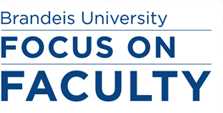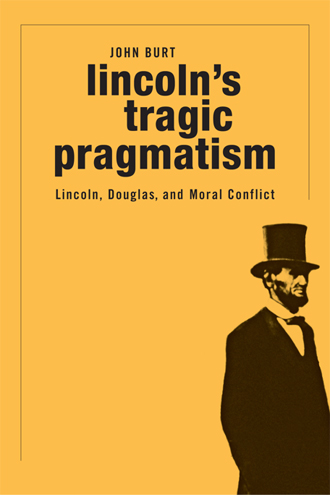Burt draws accolades for ‘Lincoln’s Tragic Pragmatism’
New York Times says it's a book every serious student of Lincoln will have to read
The walls in John Burt’s office are bursting with books whose authors seem to permeate the soft-spoken English professor’s soul. Robert Penn Warren. Keats. Faulkner. Melville. Burt’s eyes ignite as he discusses the way American poetry faces questions of transcendence and value, identity and morality.
Burt has been the recipient of numerous literary awards, and the Louis Dembitz Brandeis Prize for Excellence in Teaching. But this Sunday, Feb. 17, he will be thrust into the international literary arena when his new book, “Lincoln’s Tragic Pragmatism: Lincoln, Douglas and Moral Conflict,” receives accolades on the front page of the New York Times Book Review.
We know this will happen from an advance copy of the Times book section that reached campus this week. The review, by Stephen B. Smith, calls “Crisis of the House Divided,” by Harry V. Jaffa, “the first and still best effort to advance a philosophical reading of Lincoln” but adds, “for the first time in over a century, Jaffa’s book has a serious rival.” Burt's book, says Smith, is one that “every serious student of Lincoln will have to read.”
So where does President Lincoln fit among the company of poets, philosophers and novelists on the English professor’s shelves?
 Burt spent over two decades working on the book, which has also been the basis of his coursework: Examining 19th-century political oratory and asking how a political culture founded on deal-making and compromise comes to terms with conflicts over moral issues where deal-making and compromise may be scorned, as in the final debates over slavery preceding the Civil War.
Burt spent over two decades working on the book, which has also been the basis of his coursework: Examining 19th-century political oratory and asking how a political culture founded on deal-making and compromise comes to terms with conflicts over moral issues where deal-making and compromise may be scorned, as in the final debates over slavery preceding the Civil War.
Burt says his interest in Lincoln began long ago, and was perhaps sparked by his father’s hometown of Freeport, Ill., where one of the big turning points in the seven debates between Stephen A. Douglas and Lincoln took place. It was here that Douglas alienated Southerners with his Freeport Doctrine.
“I started writing about Lincoln as part of my book about Robert Penn Warren back in the 1980s, sketching out this book before that was even done,” says Burt. “If you specialize in American literature, Lincoln is large figure. In some ways he stands at the confluence of different strains of American literature.”
It used to be that people divided American literature between authors who were skeptics about human nature, like Hawthorne and Melville, and those who believed in the possibility of human perfection, like Emerson, Whitman and Thoreau, Burt explains, and Lincoln stands in the intersection because he was a skeptic about human nature (profoundly aware of human fallenness). He was also tied to the most powerful reform movement of the 19th century, the fight to end slavery. We sat down with Burt to discuss his book and the thinking behind it.
BrandeisNow: What is the relationship between Lincoln, English literature and poetry?
John Burt: If you’re interested in English poetry, you’re interested in the elegy, which is one of the ways that poetry deals with death, mourning, and with dark subjects about which it does not expect to have an answer. That’s why you turn to poetry, rather than science. The Gettysburg and Second Inaugural addresses are really the greatest elegies any American ever wrote.
Also, the Civil War is the political and cultural crisis of the 19th century for the United States, and it’s something we’re still living with. Lincoln is in some ways the guy who made America a nation, as opposed to merely a state. My understanding is that you become a nation in the same way that you become a self, which is to say, when you have a story. And as a student of Hawthorne, one of the things you know about stories is that you have a story when you have a problem you can’t solve. And in America, that was the problem of race.
How does being an English professor differentiate you from other Lincoln scholars?
Most Lincoln scholars are historians. Some are philosophers. Harry V. Jaffa is a political philosopher. People often ask whether my reading of Lincoln is literary, which means is it tied to the trends in contemporary literary criticism. I don’t think it’s that closely tied to those. But one of the things that I do as a literary critic is that I read texts extremely closely, with sensitivity to undertones and allusion in quotation, shades of difference, evidence of mixed feelings, and those are literary skills as much as they’re historical skills. So I think what I really brought to the study of Lincoln was a lot of very, very close reading of his texts.
Do you see similarities between Lincoln and Louis Brandeis?
Brandeis is famous for seeing the law in the context of the social life people are living when they’re subject to that law. That’s why he invented the famous Brandeis brief, which was full of sociological and cultural information. I think that he represents some of the same values— care for the little guy, care for the people who are under the thumb of power and authority.
Some say that President Obama’s Second Inaugural speech drew together themes from speeches of past presidents that he admires, such as the never fulfilled vocation for moral equality.
President Obama is clearly a very deep student of Lincoln’s writings and often quotes him directly and obliquely. In fact, I think sometimes he’s so saturated in Lincoln’s words that he’s not completely aware that he’s quoting. But in the Second Inaugural, he could not but have been aware of quoting from Lincoln repeatedly.
The thing that strikes me as most Lincolnian about the Second Inaugural is he refers to the promises of the opening sentences of the Declaration of Independence as the center and source of American nationality. Lincoln asked himself in what sense is America a nation. Other nations have been made by common blood or common language or common history, but that wasn’t obviously true of America in the 1850s when there were many immigrants coming from non-English speaking countries. What they had in common was the devotion to certain political ideals, which stood in our country in the place of blood and culture and language. I think that in putting the Declaration of Independence at the center of his own second Inaugural, he, like Lincoln, saw that as the foundation of America’s self-consciousness, America’s sense of itself as a distinct people.
 Your book is being compared to that of Harry Jaffa, the reigning expert on Lincoln. You’ve written about how your views are both similar in some respects and different in others. Can you give some brief examples?
Your book is being compared to that of Harry Jaffa, the reigning expert on Lincoln. You’ve written about how your views are both similar in some respects and different in others. Can you give some brief examples?
Jaffa is a great giant in this field, and the book he wrote in the ‘50s, “Crisis of the House Divided,” was really the first book that treated Lincoln as a philosophical figure, not merely as a political or as a historical figure. Ways where I differ from Jaffa: I am a little less harsh to Douglas than Jaffa, as he saw Douglas as a completely unprincipled fixer, who felt that whatever the majority wants is what’s right, no matter what it is. And he essentially saw the Lincoln-Douglas debates as a replay of the first book of Plato’s Republic, with Lincoln as Socrates and with Douglas as Thrasymachus. My own feeling is that Douglas was somebody who was intensely aware of the high price you pay when a conflict over any issue comes to violence. In politics, you want to say that right is not merely the will of the stronger. And the irony that Douglas found in the run-up to the Civil War was that the more closely you held your ideals, the more passionately you invested yourself in your ideals, the greater a danger it would be that you would subject those ideals to the test of force. And force ultimately is a test of who is stronger, not who is righter. My view is that Douglas was somebody who wanted to hold out the possibility of continuing a politics of deal making, negotiation and persuasion.
Another area of difference is that Jaffa, seeing Lincoln in the context of Plato and in the context of his own teacher Leo Strauss’s political philosophy, saw him as able to come to relatively certain political conclusions on the basis of rational analysis from first principles. You know, if you’re a Platonist, that’s what you do. And I think Lincoln certainly saw himself as rational. He was a great student of Euclid, but I think he was also aware that sometimes you don’t fully understand your own motives and don’t fully understand the meaning of your own values. In the Second Inaugural, one of the points that Lincoln makes is that nobody really understood what the meaning of the war was when they started fighting the war.
Yet another area where my thoughts differ from Jaffa’s is that I think that there is a large amount of what Keats would call negative capability in Lincoln’s thinking — that ability to feel your way among intuitions that you don’t fully understand all the way to the bottom. And I guess a third way that my understanding of Lincoln differs from Jaffa is that I think Jaffa felt that with the right presidential leadership, you could solve the problem. And I think that Lincoln was enough of a Calvinist in sensibility, although not a Calvinist in actual religion, but had enough skepticism about human nature and about his own motives, that I don’t think that he felt that there would ever be a clean-hands, thorough solution to any of the deep problems any republic faces, and that political crises in a republic are frequently tragic. We don’t have a reason to assume that we know our motives. We don’t even have a reason to assume that our deepest values don’t contradict each other.
What are some of your other academic interests?
I teach a lot of 19th- century poetry, Whitman, Dickinson, but also Melville. One of the things I’m proud of as a teacher is that I take Melville seriously as a poet. Most people know of him as a novelist. I teach a lot of 20th-century fiction, a lot of 20th- century poetry also. I have a sort of a second career as a poet. I have three cheerfully titled books of poems. One’s called “The Way Down.” The other’s called “Work Without Hope.” And the third is called “Victory,” but of the three, that’s the only one that really is gloomy.
Hear John Burt discuss his book on Arts Beat, the New York Times podcast
Categories: Humanities and Social Sciences, Research





